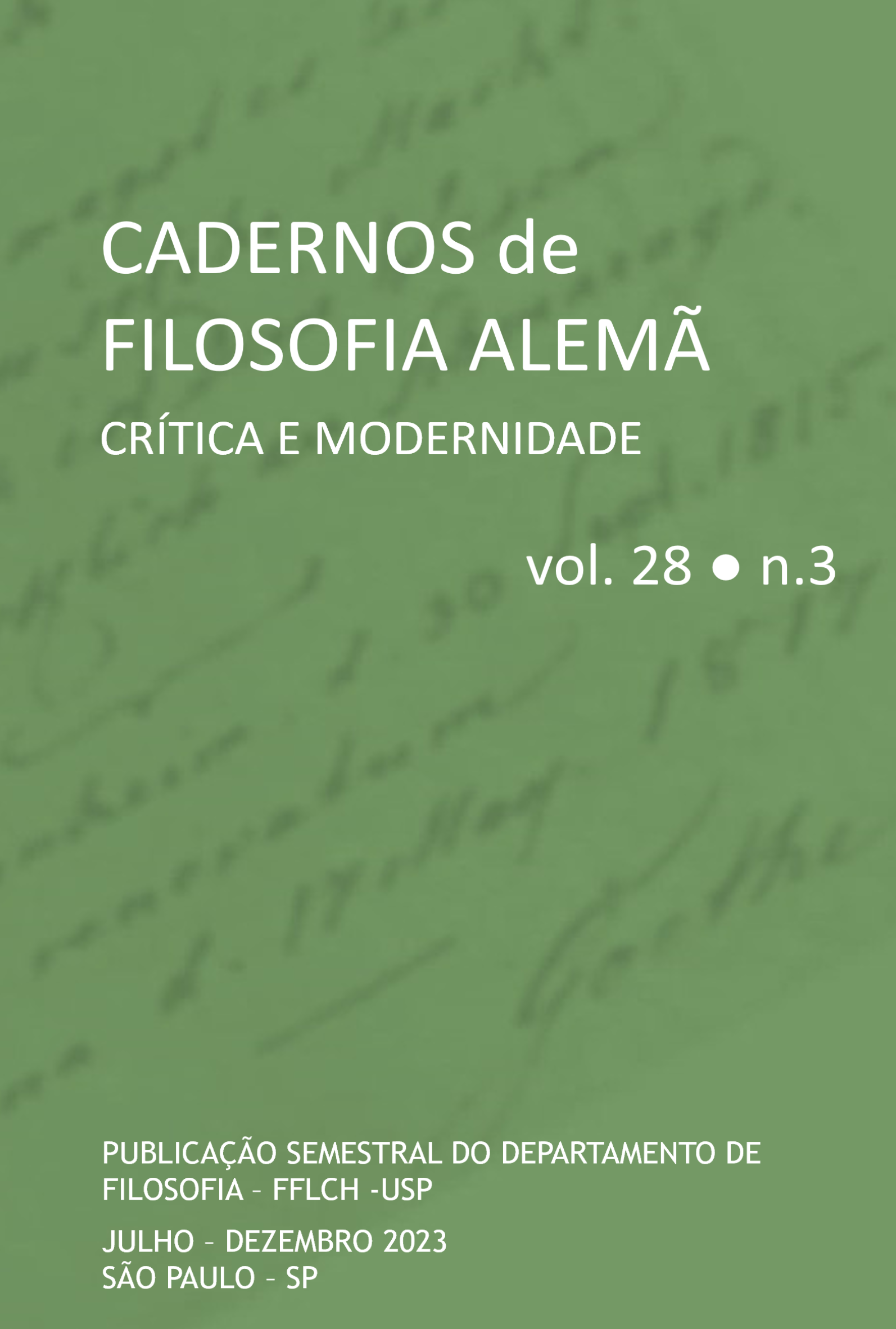Arendt's Critique to the Concept of Secularization
DOI:
https://doi.org/10.11606/issn.2318-9800.v28i03p81-94Keywords:
Secularization, Totalitarianism, History, Hannah ArendtAbstract
This article seeks to show Hannah Arendt's criticism of the secularization theorem, as presented by contemporary authors. Firstly, the theorem will be distinguished from the secularization process that occurred in modernity, as it is done by Hans Blumenberg and Arendt herself. In a second moment, the theories of Waldemar Gurian, Karl Löwith and Eric Voegelin will be commented, which will serve as examples of the secularization theorem criticized by Hannah Arendt. Finally, we will present the author's criticisms of this theorem and show how the rejection of the idea of secularization is closely related to her interpretation of history.
Downloads
References
Arendt, H. (1961). Between Past and Future: Six exercises in political thought. New York: The Viking Press.
Arendt, H. (1969). Between Past and Future: Eight exercises in political thought. New York: The Viking Press.
Arendt, H. (1972). Crises of the Republic. New York: Harcourt Brace & Company.
Arendt, H. (1994). Essays in Understanding 1930-1954: Formation, Exile and Totalitarianism. New York: Schocken Books.
Arendt, H. (2012). Origens do totalitarismo: antissemitismo, imperialismo, totalitarismo. São Paulo: Companhia das Letras.
Arendt, H. (2018). Thinking without a Banister: Essays in Understanding, 1953-1975. New York: Shocken Books.
Barash, J. A. (1998). The Sense of History: On the Political Implications of Karl Löwith's Concept of Secularization. History and Theory, 37(1), 69-82.
Baehr, P. (2012). Debating Totalitarianism: An Exchange of Letters between Hannah Arendt and Eric Voegelin. History and Theory, 51(1), 364-380.
Blumenberg, H. (1999). The Legitimacy of the Modern Age. Baskerville: MIT Press.
Duarte, A. (2000). O pensamento à sombra da ruptura: política e filosofia em Hannah Arendt. São Paulo: Paz e Terra.
Eccel, D. (2017). Debate sobre o totalitarismo: a troca de correspondência entre Hannah Arendt e Eric Voegelin. Lua Nova, 101, 141-176.
Federici, M. (2011). Eric Voegelin: a restauração da ordem. São Paulo: É Realizações.
Gurian, W. (1952). Totalitarian Religions. The Review of Politics, 14(1), 3-14.
Jardim, E. (2011). Hannah Arendt: pensadora da crise e de um novo início. Rio de Janeiro: Civilização Brasileira.
Löwith, K. (1949). Meaning in History. Chicago: The University of Chicago Press.
Rossi, P. (2000). Naufrágios sem espectador: a ideia de progresso. São Paulo: Editora UNESP.
Seitschek, H. O. (2007). The Interpretation of Totalitarianism as Religion. In: Maier, H. (ed.). Totalitarianism and Political Religions Volume III: concepts for the comparison of dictatorships: theory and history of interpretation. New York: Routledge.
Voegelin, E. (1975). From Enlightenment to Revolution. Durham: Duke University Press.
Voegelin, E. (1987). The New Science of Politics: An Introduction. Chicago: University of Chicago Press.
Voegelin, E. (1997) Science, Politics and Gnosticism: Two Essays. Washington, D.C.: Regnery Publishing, Inc.
Voegelin, E. (2000a). The Collected Works of Eric Voegelin Volume 5: Modernity without Restraint. Columbia: University of Missouri Press.
Voegelin, E. (2000b). The Collected Works of Eric Voegelin Volume 12: Published Essays 1953-1965. Columbia: University of Missouri Press.
Voegelin, E. (2000c). The Collected Works of Eric Voegelin Volume 17: Order and History Volume IV The Ecumenic Age. Columbia: University of Missouri Press.
Voegelin, E. (2009). Anamnese: da teoria da história e da política. São Paulo: É Realizações.
Downloads
Published
Issue
Section
License
Copyright (c) 2023 Theo Magalhães Villaça

This work is licensed under a Creative Commons Attribution-NoDerivatives 4.0 International License.
Information and conceptions on the texts are complete responsibility of the authors.
All the articles submitted before July 5th 2018 and those published after July 2021 are licensed under a CC BY-NC-ND license – except those published between the aforementioned dates, which are under the CC BY-NC-SA license. The permission for the translation of the material published under the license CC BY-NC-ND by third parts can be obtained with the consent of the author.
Open access policies - Diadorim
Rules applied before July 5th 2018:
Presenting a submission to our Editorial Board implies granting priority of publication for “Cadernos de filosofia alemã”, as well as transferring the copyright of texts (once published), which will be reproduced only with the manifest authorization of the editors. Authors keep the right to reuse the texts published in future editions of their work, without paying any fees to "Cadernos”. We will not grant the permission to re-edit or translate the texts for third parts without agreement of the author.


